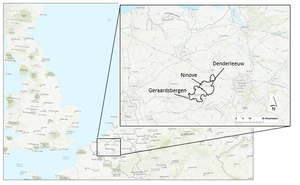LC 00284: verschil tussen versies
Geen bewerkingssamenvatting |
Geen bewerkingssamenvatting |
||
| Regel 9: | Regel 9: | ||
''Type of area (rural or urban):'' a lot of residential area or urbanised zones within rural area, industrial- and retail areas, farmland, railways and roads | ''Type of area (rural or urban):'' a lot of residential area or urbanised zones within rural area, industrial- and retail areas, farmland, railways and roads | ||
''Relevant characteristics of the water system (main water bodies):'' From 13 to 104 m above sea level and the main water body is the Dender river ({{Cite|resource=Bestand:6449.7455.2 24 6 2019.pdf|name= | ''Relevant characteristics of the water system (main water bodies):'' From 13 to 104 m above sea level and the main water body is the Dender river ({{Cite|resource=Bestand:6449.7455.2 24 6 2019.pdf|name=Vlaamse Milieumaatschappij, 2016|dialog=process-file-dialog}}). | ||
==== Flood risks ==== | ==== Flood risks ==== | ||
* Rainfall floods in Moerbeke-Viane and river floods in the centre of Geraardsbergen | * Rainfall floods in Moerbeke-Viane and river floods in the centre of Geraardsbergen | ||
* Probability: the risk probability is considered medium | * Probability: the risk probability is considered medium | ||
* The Dender has naturally a quick hydrological response because the combination of a strong topography and the loam soils in the uphill zones ( | * The Dender has naturally a quick hydrological response because the combination of a strong topography and the loam soils in the uphill zones (). In case of intense rainfall, the river response is relatively quickly, increasing its level. Furthermore, the Dender Basin has been subject to land sealing through urbanization enhancing this process. | ||
* The last flood of 2010 had a lot of impact and was identified as having a return period of 100 years. During these floods, an estimated 152 households were flooded ({{Cite|resource=Bestand:7 DENDER Inventarisatie overstromingen nov2010 LR.pdf|name=Anon., 2011|dialog=process-file-dialog}}). According to forecasts this could change into a 20 years return period by 2100 onwards. The total financial damage after the floods of 2010 was estimated at 180.000.000 EUR ({{Cite|resource=Bestand:PhD BarbaraTempels.pdf|name=Tempels, 2016|dialog=process-file-dialog}}). | * The last flood of 2010 had a lot of impact and was identified as having a return period of 100 years. During these floods, an estimated 152 households were flooded ({{Cite|resource=Bestand:7 DENDER Inventarisatie overstromingen nov2010 LR.pdf|name=Anon., 2011|dialog=process-file-dialog}}). According to forecasts this could change into a 20 years return period by 2100 onwards. The total financial damage after the floods of 2010 was estimated at 180.000.000 EUR ({{Cite|resource=Bestand:PhD BarbaraTempels.pdf|name=Tempels, 2016|dialog=process-file-dialog}}). | ||
* Impacts: If a 100 year-flooding occurs the potential number of households affected would be 600. | * Impacts: If a 100 year-flooding occurs the potential number of households affected would be 600. | ||
Versie van 27 jun 2019 18:58
The Belgium pilot Geraardsbergen is located southwest of Ninove in the upper stream of the Dender. The Province of East-Flanders focuses on the most upstream zone of the Dender in a sub-municipality called Moerbeke-Viane.
Figure 1: Map featuring the location of the FRAMES Belgian pilot areas, one of which is Geraardsbergen.
Size of the pilot area: a total area of 166 km² (sum of the 3 municipalities)
Number of inhabitants: total of 92.100 inhabitants
Type of area (rural or urban): a lot of residential area or urbanised zones within rural area, industrial- and retail areas, farmland, railways and roads
Relevant characteristics of the water system (main water bodies): From 13 to 104 m above sea level and the main water body is the Dender river (Vlaamse Milieumaatschappij, 2016).
Flood risks
- Rainfall floods in Moerbeke-Viane and river floods in the centre of Geraardsbergen
- Probability: the risk probability is considered medium
- The Dender has naturally a quick hydrological response because the combination of a strong topography and the loam soils in the uphill zones (). In case of intense rainfall, the river response is relatively quickly, increasing its level. Furthermore, the Dender Basin has been subject to land sealing through urbanization enhancing this process.
- The last flood of 2010 had a lot of impact and was identified as having a return period of 100 years. During these floods, an estimated 152 households were flooded (Anon., 2011). According to forecasts this could change into a 20 years return period by 2100 onwards. The total financial damage after the floods of 2010 was estimated at 180.000.000 EUR (Tempels, 2016).
- Impacts: If a 100 year-flooding occurs the potential number of households affected would be 600.

